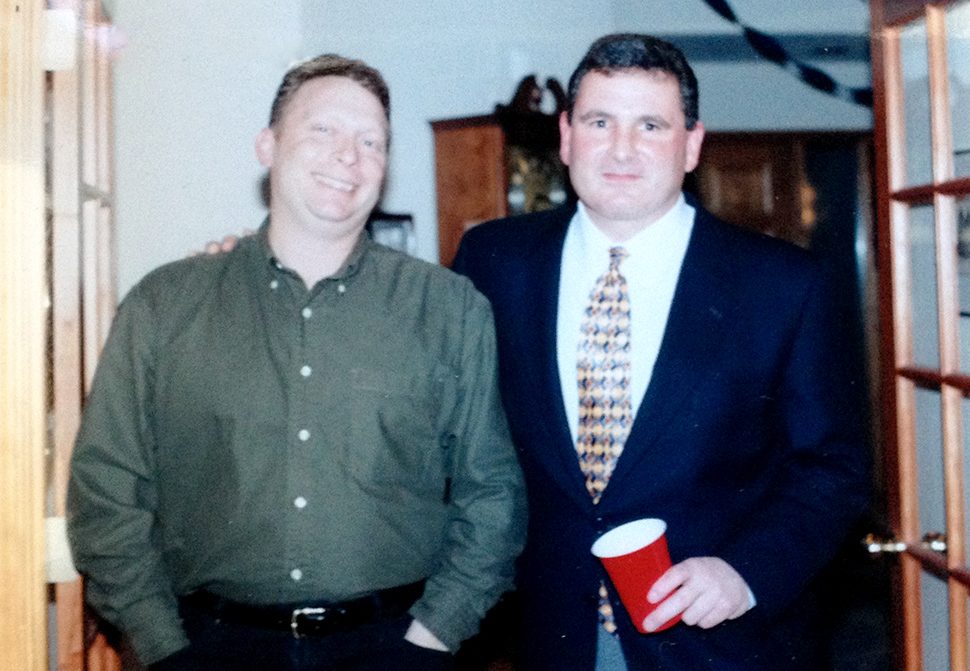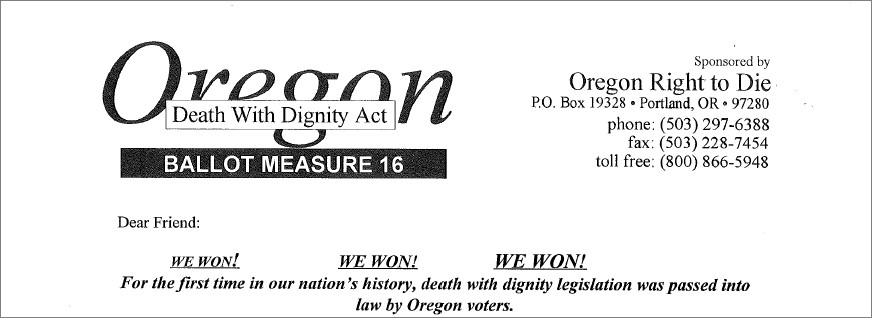To commemorate the 25th anniversary of the passage of the Oregon Death with Dignity Act, we are featuring interviews with those who in 1994 campaigned to pass the law. We recently sat down with Geoff Sugerman, who managed the Measure 16 campaign for the Oregon Right to Die Political Action Committee and continues to work as a political strategist with Death with Dignity National Center. He shared his memories of the landmark campaign.
Below is an audio recording of select excerpts from our interview with Geoff. A more in-depth written Q&A follows.
Death with Dignity National Center: How did you become Oregon Right to Die’s campaign manager?
Geoff Sugerman: I moved to Oregon in 1990. My first job was working for Governor Barbara Roberts as a speechwriter. After I left that job, I started my own political consulting business. In early 1993, I got contacted by Oregon Right to Die. They were looking for a campaign manager and so I applied for the job.
Death with Dignity National Center: What appealed to you about the cause?
Sugerman: I did not have a personal experience that connected me to the issue, but I believed in the cause. At that point, I was really looking to run campaigns, and it was a business opportunity initially. After a while, it turned into something a whole lot more than that.

Geoff Sugerman, at left, who managed the 1994 campaign to pass the Oregon Death with Dignity Act, and Eli Stutsman, Death with Dignity National Center Board member and lead author of the Oregon law. Sugerman now is the National Political Strategist for Death with Dignity.
Death with Dignity National Center: What were the early days of the campaign like?
Sugerman: Political campaigns have this flow to him where they start off at this very basic level and they accelerate and then pretty soon you’re working 14-hour days and you haven’t even realized it. Every piece of that campaign was crazy. There was never a chance to process what was going on.
I had never run a statewide initiative campaign before. I didn’t know any of the rules. It was a constant process of just trying to figure out what we were doing and trying to stay on top of that.
Death with Dignity National Center: What was your strategy to build support and gather signatures from across the state?
Sugerman: We developed a strategy where we hired on-the-ground people in three or four parts of the state to build up operations. We hired people on a contract basis to set up operations there.
Death with Dignity National Center: Who got the very first signature of the campaign?
Sugerman: I did, at least I claim I did. I remember the day we got approval from the Oregon Secretary of State’s office to place a measure on the ballot. I walked out of that office, went and got copies made of the signature sheets, drove them down to Eugene, gave them to our signature-gathering folks there, and then went over to the Eugene post office and started collecting signatures.
Death with Dignity National Center: You then had 10 weeks to gather over 100,100 signatures. Was it a race to the finish?
Sugerman: Oh, yes. We spent those 10 weeks collecting signatures, paying contractors to collect along with volunteers. But that wasn’t the end of the process. We had to divide the signatures up by county, put them in boxes, and get them ready to submit. We stayed up for two straight days getting them ready. Then, Eli Stutsman and I drove them down to the state Capitol in Salem. It was nuts.
Death with Dignity National Center: During the signature-gathering process, you also were fundraising for the campaign. How did you raise money?
Sugerman: We set up our own phone banking operation in the office of the First Unitarian Church in Portland, and we started our fundraising. We also sent fundraising letters to supporters.
We knew we were going to get killed in fundraising because our most formidable opponent was the Catholic Church, but we knew if we could get to a certain level, we could compete.
Death with Dignity National Center: Oregon’s Catholic leaders sermonized against the law, wrote scathing editorials in newspapers, and even ‘passed the plate’ at Sunday services to raise money for an opposition campaign. How did you counteract their efforts?
Sugerman: We adopted a strategy very early on where we said, ‘we are going to win the earned media as much as possible and we’re going to have a strong advertising campaign.’ Through that process, we worked with an advertising firm out of L.A. They were incredible.
Our message was simply that our opponents didn’t have the right to can’t force their will on the rest of us. And fortunately Oregon is one of those places in the country that is less churched, I think, than any other state, at least that was true back then.
We also were able to counteract the opposition’s fear tactics – this is euthanasia by lethal injection – by simply saying, look at the initiative. There’s no lethal injections, there’s no mercy killing. The way we’d written the initiative was instrumental in being able to counteract the arguments of our opponents.

Sugerman and Stutsman in 1994.
Death with Dignity National Center: Around Labor Day 1994, Measure 16 is ahead in the polls. A month later, it’s a toss-up. How did you approach the final push in that campaign to ensure you hung on to support?
Sugerman: That last point of the campaign, we were doing so many media appearances, and people were watching the campaign carefully. It was by far the most controversial issue on the ballot that year.So there were dozens of forums, countless newspaper and TV stories. It really consumed the election this year.
We knew we just had to hang on to that 50 percent plus one, that was our mantra.
Death with Dignity National Center: What happened on election night, November 8, 1994?
I remember sitting in a back room, making calls around to election offices in different counties. We had Multnomah County, we had Lane County, we had Washington County…the large counties. Once I got those numbers, I thought, we’re going to win. A few minutes later, I remember, a television news analyst, Tim Hibbitts, called the race for us.
Death with Dignity National Center: Oregon Right to Die sent out a celebratory letter to supporters shortly thereafter. Across the top of the page are the words: “We won! We won! We won!”
Sugerman: We didn’t just win in the larger, more urban counties. We broke dead even in the rural counties as well. I don’t think anybody would have expected us to even be competitive in those counties.
I think that’s a testimony to where Oregonians are at. They are an independent lot. They want to do things that nobody else wants to do. They relish that role. The same holds true today.

Excerpt from Oregon Right to Die’s press release on the victory at the polls
Death with Dignity National Center: You’re still involved with Death with Dignity’s efforts to pass laws in other states. What’s kept you connected to the movement for medical aid in dying?
Sugerman: I remember so clearly, it was about six months after the campaign. I was sitting in my house thinking that this death with dignity campaign is what I was brought to Oregon to do. I still believe this to this day, there was nothing else I could ever do professionally that would compare to helping Oregon become the first political jurisdiction in the world to approve death with dignity at the ballot box.
In the end, we succeeded because we never gave up on the belief that giving terminally ill people the right to die on their own terms was so important.


2 Comments.
Deborah Ziegler
A very personal thank you to Jeff Superman and Eli Stutsman! My daughter, Brittany Maynard, had just celebrated her tenth birthday when you worked together on this historic election win for terminally ill patients. We had no idea that she would someday find deep comfort and relief in Oregon availing herself of the tight to Death With Dignity. From the bottom of my heart, thank you.
Deborah Ziegler
Geoff Sugerman, your name got spellcheck changed to Superman! But, it fits in this case!
Comments are closed.